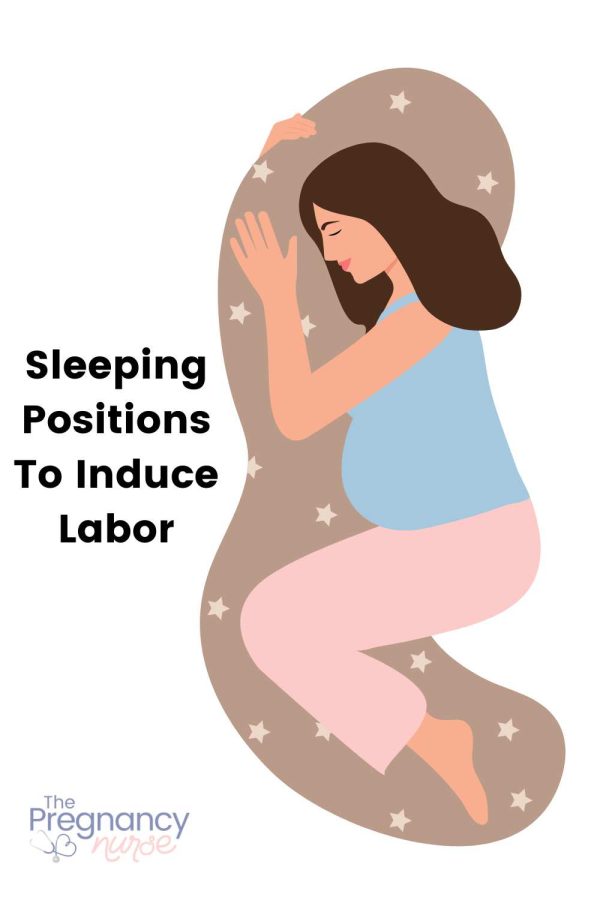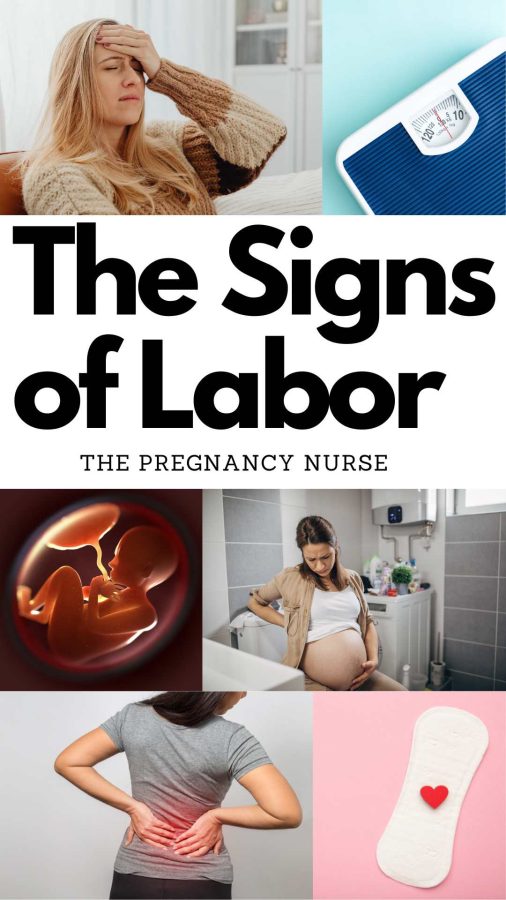👋 I’m so glad YOU are here. Are you looking to also get your partner prepared? This is for BOTH of you. Couples just love it and I know you want to both feel prepared!
Can you sleep through contractions? It’s a great question because sleeping is a great way to pass time for something you’d just like to get over with. So, how can you sleep through contractions, and could you have your baby without even knowing it? Let’s talk about it.

But first, how do I know so much about sleep during early labor? Hi, I’m Hilary. I’ve been a nurse since 1997 and I have 20 years of labor and delivery experience and I have a LOT of thoughts about sleep and labor after seeing many patients labor at home before coming in to the hospital (as well as trying to sleep during my own labors) — so I’m a great resource on this one!
Can You Sleep Through Contractions?
Yes, early labor contractions can be slept through, but it varies depending on person to person. There are some tips on being able to sleep through labor and also some caveats about staying in one place for too long, so let’s talk more about it.
And yes, labor can be complicated, so I definitely recommend this to make it simple and easy to understand.
Definition of Sleep
This is sort of complicated, because sometimes we “pretend” like we’re sleeping (my mom called it “resting her eyes”). But that is different than actual sleep. In general it doesn’t have the restorative capabilities of sleep (as much) but it can still help give us energy and strength for what’s coming.
BUT you need to be very honest with youreslf when you’re “resting your eyes” vs actually sleeping.
Because when you’re resting you can still move and adjust your body which can help labor progress. This is extra important because you won’t have the relaxation of your muscles and mind when you’re actually sleeping.
So, while this isn’t a websters’s definition of “what sleep is”, you know what it is and it’s important to differentiate as we move forward.
Should You Sleep During Early Labor?
Heck yes you should! There are lots of benefits to sleep in early labor.
- Relaxation will help oxytocin flow
- It gives your body strength and rejuvenation towards the efforts that are coming
- Early labor can be tricky, and it may not actually be labor, but the sleep is helpful either way
- It passes the time til’ you’re in actual labor
- You miss any of the discomfort of staying awake during those early cramping stages
I see some websites talking about how if your body stays in one position too long it can be bad for labor, but I disagree in the instance of actual sleep. During that time your body is relaxing (vs the tensing up we all tend to do while we are in pain). It’s a big benefit to your brain, your body and your baby.
As a nurse if I could get my patient to sleep (and they were contracting) I knew it would help labor progress, and help her feel more ready for pushing when the time came.
To combat the whole “body in one position too long” I’d recommend a couple of pillows between your legs. Not only will your hips thank you, but it may help open that pelvic outlet for baby to progress.
That being said, I have almost always found that the way a patient is comfortable is a good way for labor to progress. And frankly, if you can get comfortable and sleep, that’s going to be a big win for you.
Pro Tip: A doula is a great resource to have during early labor at home as they can guide you in things that can help let labor progress and help you relax. If you’re planned on having a doula, make sure they’re willing to come to your home in early labor (or what’s included in that area).
Grab my hospital packing list while you’re here:
Tricks to Sleep During Labor?
The hard part is actually sleeping:
- Your mind is racing over the next steps
- You are likely in some pain and that isn’t usually conducive to sleep
- You’re thinking about if you’re ready to go to the hospital and what that entails (having your hospital bag pre-packed can help that)
- Your partner may also be a basket case that isn’t helping things (been there – which is why I made this)
- You may be thinking of all the things you need to do to get ready for baby (even though there’s a good chance it’s too late to do a lot of those things — although not too late to take a prenatal class — this one only takes a few hours)
So I have a few tips to sleeping during labor, and most of these are things you’ll need to prepare ahead of time, or talk with your provider about in your last few weeks of pregnancy as you get closer to your due date.
I have a whole podcast on what to do when you’re in labor at home:
Get Something For Sleep
You could ask your doctor if there is anything they can give you for sleep during early labor. They may recommend something simple like Benadryl, or they may recommend something more. In the hospital we will often give sleeping medications during an induction that we think will be a while. So, just ask — see what they say. I have no recommendations here, they need to come from your provider.
Pain Medication?
Ask your provider if it’s OK to take something for the cramps/pain in early labor. I’ve had some patients take just a tylenol or ibuprofen and they said that it did help them relax during the early stages. So, ask your provider if something like that would be OK for you to take.
Caveat: This isn’t going to take away all your pain, and you shouldn’t expect that. It can just help a little, and sometimes that’s enough to help you sleep for a bit — and that’s good news!
Get Prepared
Much like finals coming up and sleepless nights before them, when you’re prepared for something you are just more able to relax. When you get your birth class in and feel more prepared you’re not going to have that frantic feeling like when you think labor is beginning, you’re just ready for what comes next. I recommend this birth class 100%.
Get Comfy
There are a lot of rituals we each use to prepare for sleep. Whatever yours are, try to just do them. Even though this night feels different and like you may not get the 8 hours you’re hoping for — just prepare for bed like you usually do. Put on the PJ’s brush your teeth etc.
If it’s during the day, dim the light in the room, get a favorite blanket — just give yourself the best chance for rest.
Oh, and be sure to tell those important people that you’re going to have a nap and you’ll text then when you wake up so you’re not being bothered by your phone (or turn it to silent — but they’ll feel better knowing what’s going on).

Hydration is Key
The nemesis of sleep is your bladder during much of later pregnancy. However, you’re not drinking you may contract needlessly as it can make your uterus irritable. With that you’ll have pain, and could be quite miserable, just because you’re dehydrated and your uterus is telling you to get more water so it can function right!
So, when you’re not asleep, make sure that you’re drinking lots of fluids. The benefit is two fold in that your uterus will be happier, but also if you go into labor your veins will be nice and plump for your IV. A win-win. 🙂
Just make sure to pee before you lay down for a nap — but I bet you’re good at that by now.
Have you checked a birth class off your to do list✅? I have a few I recommend:
❤️ Best class for couples {per BabyList}
👩💻 Best class available on demand
⚡ Best class JUST for pain management
👶 Best Postpartum-Only Prep
❤️🧡💛💚💙💜 My favorite class is here.
Now is the time to get started!
Keep Eating
Some people have some weird notion that you shouldn’t eat at all in early labor, and this couldn’t be further from the truth. Your body needs those nutrients. It’s like you’re going to run a marathon! You certainly wouldn’t starve before that.
A few thoughts on food during labor:
- Eat light — I wouldn’t eat big meals. The could give you heartburn and may make you feel worse than you did before. Sometimes your stomach wants to contract too and a big meal will make that more miserable.
- Balance carbs and proteins — don’t eat just a brownie. Eat a brownie and a piece of cheese, or some nuts (diabetics, stick to what your plan is). This will allow your blood sugar to stay more even and you won’t have highs and lows of sugar which wouldn’t do you any favors.
- Eat something you love — Oxytocin is a pleasure hormone, so the happier you are (even if it’s provided by a favorite piece of pizza — happiness helps).
- Partners can help! You may not be feeling like you want to eat during early labor (or, frankly — do anything), partners can come hand you a few nuts, or a piece of cheese to get down with some fluids every now and then to keep your strength up!
Pro Tip: Partners are the help during early labor, so getting them educated on what they can do to help you out is key! I have a partner bonus video in The Online Prenatal Class for Couples that gives them lots of tips to be your best helper!
What If You’re Tired But Can’t Sleep During Labor?
This is the bigger issue that a lot of people have. They’re tired, but they really just can’t sleep and that’s OK. At that point you have a few options.
Distraction — put on a show, or watch some tiktocks for a bit. You don’t want to get caught-up in your pain. It can be a cycle of misery, so the more you can ignore it the better.
Change Positions — This is a big one when you’re not actually sleeping. If you’re just resting your eyes try to change positions every 30 minutes or so. While going from laying down to hands and knees is nice (although, personally I can’t hold hands and knees for a really long time), even shifting how your hips are in the bed, turning sides, or adding a pillow between your legs can help a lot.
Massage to Relax — Some light massage from your partner, or a massage ball can help you relax and possibly ultimately get som rest. I talk about these techniques in the natural pain management video in here.
Pro Tip: Your partner can help you do a 30-30 routine. 30 minutes of standing and shifting your hips, and then 30 minutes of rest — and then recycle through these. You don’t really want to set a timer, because if you do fall asleep go with it — but they can check on you to see if you’re alseep or just resting. Hands and knees can be a great way to get rid of lower back pain, and help your pelvis relax with the constant downward pressure off of it.
Standing positions seem confusing, but they don’t have to be. It’s just a time that you’re upright. For me, I often would clean (cleaning your bathtub can be great in early labor because you’re on your hands and knees and moving, but also cleanig your tub which you’ll thank yourself for), cook or tidy up the house. Then I’d take some time to rest after that (and my partner could finish cleaning the tub after my knees were done).
For me it really boils down to: Sleep if you can, but if you can’t try to alternate periods of movement with rest.
Of course, with all this talk of sleeping during labor comes this question:
Will I Sleep Through My Baby Coming Out?
I have yet to see it, or hear of anyone sleeping through their baby coming out. Most often when the contractions become intense enough you’re going to wake up. It might be time to time them and see when you should head into the hospital.
Some people use something like hypnobabies that allows them to relax into the labor pain but it’s not really the same as sleep (and many people don’t find it effective, so you can’t plan on it 100%).
Pro Tip: I don’t really recommend timing contractions all that much until they’re really painful, and taking your breath away (like, you can’t talk through them). Prior to that the contractions are likely not strong enough to be causing big changes in your cervix — but it’s always smart to keep an eye on things. If your contractions hit the 2-3 minute apart mark, I’d probably call my provider to just check in (3-5 minutes if it’s your second+ baby) even if they’re not quite that painful yet.
Sleeping During Labor FAQ’s
Can Labor Start While You’re Sleeping?
Yes, it can. Sometimes you’ll wake up and realize you’ve slept through some of those early labor bits but contractions are now pretty painful — that the contractions woke you up. Not unusual at all. I have a whole post on if labor can start while you’re sleeping, and another one on if labor normally starts at night that you might find helpful.
What are the stages of labor?
1. Early Labor — that’s what we’ve mostly talked about in here. Most often this is the part of labor that goes slow, and then picks up steam heading you into….
2. Active Labor — this is where your cervix is actively dilating as baby is being pushed into the birth canal by your uterus.
3. Pushing — This is once the baby’s head is beyond the cervix (often called 10 cm or “complete”) and you can now help your uterus push the baby out of your body.
4. Delivery of the baby and the placenta.
I have a whole stages of labor bonus video in The Online Prenatal Class for Couples that talks about the stages of labor.
How long does labor last?
Really varies on a few things:
- How many babies you’ve had
- How progressed your baby is into the birth canal prior to labor
- How your baby is positioned in your womb
- How your body takes all the labor hormones and allows the baby into the birth canal.
Every person’s body and labor is different.
The textbook case is 1 cm/hour plus 2 hours of pushing on your first baby (this is ALL AVERAGES). But that starts once your cervix is actively dilating and progressing. But that is all based on averages, and I can guarantee your baby didn’t read the textbook.
How Do I Know if I’m Really in Labor?
This is the hardest part. I have a whole post on the signs of labor that explains more of what to watch for.
The main difference is that it keeps progressing until you’re 100% sure this is the “real thing” but that’s just hard to know until you get there. Labor can start and stop or be prodromal (where it just takes hours and sometimes even days to get going).
When Should I Call My Health Care Provider or Go to the Hospital?
I don’t think it’s a bad thing to call your provider when you think you’re in labor. That allows them to review with you what to watch for (based on you and your particular needs) and when you should head to the hospital.
Of course, labor isn’t the only reason to call your provider. Check out my post on reasons to call your provider.
Can your water break while you’re sleeping?
Sure can! Lots of people feel a “pop” while they’re asleep, and then they get up, only to feel a gush of fluid when they get up. Most often this happens when you’re already in labor, but if you’re not contracting, studies show you will likely shift into labor soon.
Call your provider once your water breaks to let them know and get some ideas on what you should do next. My sister site has a ton of info on water breaking.
What if my contractions stop while I’m asleep?
You weren’t in actual labor if your contractions stop while you’re asleep. Relaxing and getting some rest won’t stop “real” labor — but it reminds us that early labor comes and goes. Personally, I had contractions nightly for weeks that would go away as I slept before I actually had my third baby. Who knows why — it was dehydration, or just a uterus that was mad. Who knows, but I wasn’t a fan. Either way, we can’t predict the future until it’s the past.
This goes for all activities and labor. If you move and labor stops, it’s not real labor. If you rest and labor stops, then it’s not “real” labor. Hopefully the “real” thing will come soon!
But, as I’ve said one of the BEST Things you can do is get prepared. Come join me in The Online Prenatal Class for Couples — the simple way to get prepared for your hospital birth in just a few hours!

And, if you’re not quite sure you’re ready for that whole thing, check out my free prenatal class. It’s your first step toward getting in the driver’s seat of your birth.







 When to start Eating Dates During Pregnancy?
When to start Eating Dates During Pregnancy?
